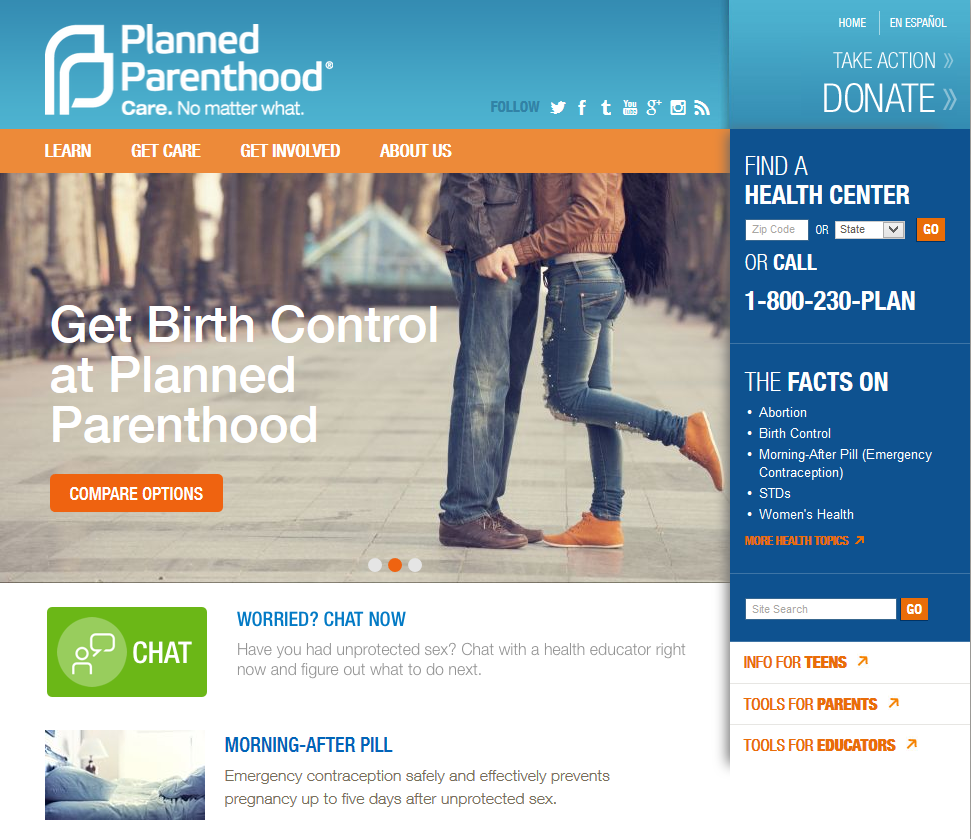
Planned Parenthood: Info for Teens

Info for Teens is a section the Planned Parenthood website that targets youth and addresses sexual health issues such as masturbation, homosexuality, and sexual rights.
Curriculum Highlights
The INFO FOR TEENS section at www.plannedparenthood.org addresses a wide range of sexual topics including the following:
Masturbation
Is masturbation unhealthy?
Answers include the assertion that women who masturbate have higher self-esteem, and men who masturbate have lower rates of certain cancers.
Is there such thing as too much masturbation?
Is it normal to masturbate before puberty?
If I masturbate with an object, can it give me a sexually transmitted
infection?
What should I do if my parents catch me masturbating?
LGBTQ
How do I know if I’m gay?
Is it true that it’s easier to get a sexually transmitted infection if you’re LGBTQ?
What does “transgender” mean?
Answer: “Some people find that their gender identity is not in sync with their sex — for example, someone with a penis might be declared a boy at birth, but grow up feeling, thinking, and acting more like a girl. Many people who feel this way call themselves transgender…Transgender can include people who are simply not satisfied with the strict gender roles society dictates, those who enjoy “playing” the other gender. The term transgender also includesthose who take hormones and/or have surgery to alter their physical bodies to match their gender identity,also known as transexual.” [sic]
Also of interest is this statement in the masturbation section: “The myth is that it’s abnormal for children to masturbate. The truth is that masturbation is a perfectly healthy activity at any age…In fact, experts recommend that parents teach children that it’s normal for people to touch their sex organs for pleasure.” The teen section of plannedparenthood.org also includes a birth control quiz (including information on the “morning-after pill”) and a mock game show segment wherein a teenage girl promotes and normalizes masturbation.
Particularly concerning is the answer to the question listed above, “Is it true that it’s easier to get a sexually transmitted infection if you’re LGBTQ?” Answer: “No. Anyone who has sex with another person is at risk of getting a sexually transmitted infection. A gay person’s chance of infection is no different from a straight person’s.” While it is true that simply declaring a particular sexual orientation does not increase the odds of infection, male homosexuals suffer significantly higher rates of infection for many STIs, leading the U.S. Centers for Disease Control to acknowledge that there is a “disproportionate burden of disease among gay and bisexual men.”1
Also omitted from the answer is the acknowledgment that two people who are infection free and have sex only with each other are completely free of infection risk from sexual intercourse. IPPF ignores the reality that the best ways to stem the growing epidemic of STIs and unwanted pregnancies is abstaining from sex before marriage and practicing fidelity after marriage (i.e., sexual responsibility and monogamy) because these realities neither support IPPF’s sexual rights rhetoric nor advance their business model.
Additionally concerning is that as teens move into their college-age years, Planned Parenthood’s VOX program is ready to help emerging adults continue to exercise their sexual rights through providing services such as “pants-off parties,” orgasm workshops, and vaginal and anal fisting kits.2
_______________
1. Bolan, Gail. “Syphilis and HIV: A Dangerous Duo Affecting Gay and Bisexual Men.” Blog.aids.gov. Dec. 13, 2012. Web. Accessed Jan. 10, 2014.
2. Hooking Kids On Sex II. American Life League. http://www.youtube.com/watch?v=j7XR9yH2ETk
— Coming Soon! —


